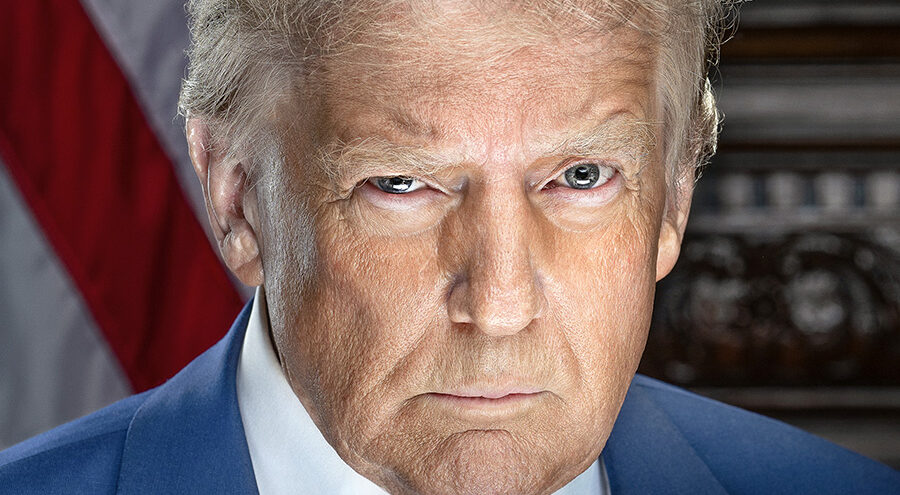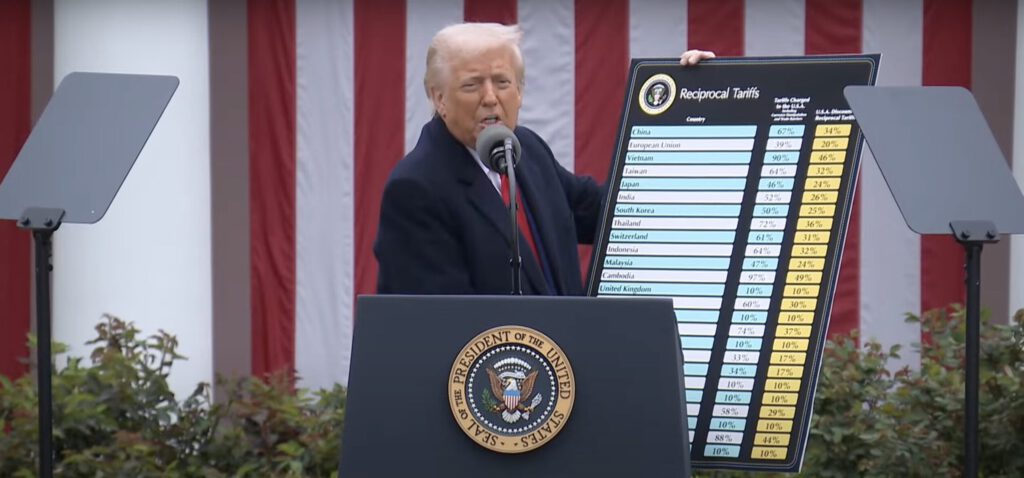
The whole world is puzzling over what US President Donald Trump is up to. His approach with a global recession is a clever move for the USA.
The beauty of politics is that it doesn’t work without the economy.
That’s why we launched the business news portal muula.ch, among other things – because Switzerland needs business media so that politicians can’t just do what they want.
Inflation must fall
The explanation of US President Donald Trump’s approach to a global trade dispute is quite simple: a recession benefits the US more than it costs it.
However, this may only make sense at second glance.
What are the main problems for the new strongman in the White House?
First of all, he needs low prices for his voters. But these are hard to come by during an economic boom.
Oil price and housing in focus
One solution would therefore be a recession. In this case, nobody raises sales prices, but all companies go into discount wars.
In addition, the oil price, which is important for the US economy, will fall almost automatically.
The new US protective tariffs would actually increase inflation among American consumers. In an economic crisis, foreign suppliers would not be able to push through any price increases.
On top of this, Trump is providing cheaper housing, which has a strong influence on inflation in the US, by chasing masses of migrants out of the country.
Increasing appetite for US debt
The second problem facing the US is their national debt, and in particular the year 2025, when around 9.2 trillion Dollars in bonds will expire or have to be refinanced.
But who else wants to lend money to Trump or the USA?
Recently, the willingness of the main creditors China, Japan, Canada, the UK and Switzerland to purchase US government bonds has already fallen sharply.
Security as a service
Trump must therefore find a way to encourage foreigners to invest in US securities.
With his “tariff hammer”, every country in the world is now practically queuing up in Washington to negotiate.
Without the new punitive tariffs, no one in the world would have moved.
The Americans are also linking the subscription of US bonds to the nuclear umbrella – security guarantees are being sold “as a service”, so to speak.
Below four percent
In difficult economic times, investors switch from uncertain equity investments to safe government bonds. Here, too, a recession fits the bill perfectly.
At the same time, the high demand for these securities is pushing down the interest rates that countries have to pay on those issues.
On Friday, the yield on 10-year US bonds fell below 4 percent for the first time since Trump’s election as the new US president.

This is precisely what will help Trump avoid having to spend so much taxpayers’ money on servicing the debt and thus gives room to maneuver in the budget and for investments, which the US administration can use to ease the recession somewhat.
In the long term, this will certainly compensate for the economic slump. The stock market slumps are also a healthy correction to the previous stock market hype.
Opponent Powell
In connection with the refinancing of US government debt, the level of interest rates is under discussion.
Every ‘millimeter’ that interest rates fall saves the US government hundreds of billions directly.
This is where the US central bank, the Federal Reserve Bank (Fed), comes into play. This is where Jerome Powell sits, refusing to lower the key interest rates.
Trump trumps with interest rate cut
It’s a ‘power play’ against him. On Friday, the head of the US central bank also spoke out and said that inflation expectations were unclear.
The Fed would therefore hold off on interest rate decisions. Trump immediately attacked him, saying that the price of oil was low, US inflation was low and Powell would have to lower key interest rates.
Ultimately, a recession brought on by Trump would force the Fed to grudgingly cut interest rates.
The central bank’s mandate stipulates this when unemployment figures rise.
Rising unemployment is not a problem for Trump, as the unemployment rate in the US is at a historically low level. And foreign investment will even increase employment again over time.
Tax reform helps company profits
Last, but not least, a global economic downturn helps to push through political goals. The state then has to make particular savings and companies need more economic freedom.
A recession sets Trump’s planned tax reform in motion.
US companies and investors will first have to go through a lean period to achieve this goal.
But then the tax savings will bubble up for years, if not decades.
Sell US goods with pressure
Trump described the falling stock markets at the weekend as a necessary evil. This is like bitter medicine that a patient has to take in order to be eventually cured of an illness.
It is unlikely that foreigners will buy more goods from the USA in future anyway. The Americans know this all too well, because no one wants to have gas-guzzling cars or chlorinated chicken, voluntarily, anyway.
So, pressure is needed urging foreigners to buy US Boeing aircraft or US armaments, for example.
Perhaps Switzerland will buy even more US F-35 fighter jets from the USA in order to reduce the exorbitant US punitive tariffs?
Unleashing Wall Street capitalism
Trump is also freeing up the economy from burdensome shackles and creating better economic conditions.
He is not only thinking of bureaucracy or environmental regulations for companies, but also of many regulations, on less meat consumption, less air travel, etc.
The more severe a recession is, the faster such change takes place. Unbridled Wall Street capitalism is back.
Easier to act on the world stage
All in all, a period of difficult economic development benefits the USA far more than “business as usual” would have done.
In addition, it is easier to push through political goals on the world stage when China, the European Union & Co. are weakened.
After all, Trump is supported by influential American circles and their agenda is currently being enforced with a vengeance around the world.
No time to lose
Anyone who has all this in mind will see that Trump’s plan is simply brilliant for strengthening the USA and its role in the world in the long term.
The day of the punitive tariffs was indeed a “Liberation Day”.
The new US administration must now ensure that their upcoming recession does not fail to have an impact before the midterm elections. Meaning Trump does not have much time, because such economic adjustment processes take time.
And economic knowledge helps to better understand politics.
Precisely why we launched muula.ch.
07.04.2025/kut/ena.





